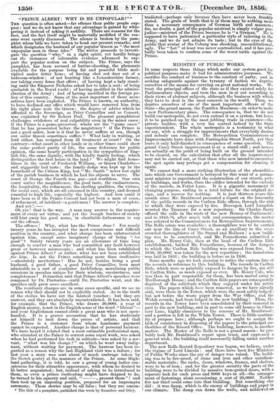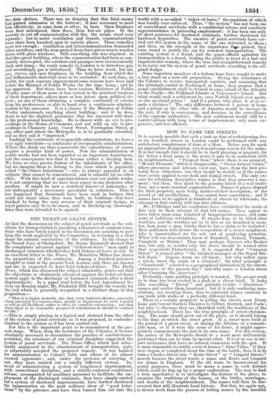MINISTRY OF PUBLIC WORKS.
Ix some respects those things which make our system good for political purposes .make it bad for administrative purposes. We sacrifice the conduct of business to the conduct of party, and ia seeking safeguards against the tyranny of faction we deprive ourselves of the means for carrying on great national works. We treat the principal offices of the state as if they existed solely for Parliamentary objects, and turn the men in or out according to their views of abstract subjects, although the business with which they have to deal is the most concrete in the world. Thus, .we deprive ourselves of one of the most important offieers of the State—the grand mason, the Pontifex Maximus—in order to make a new Parliamentary place. The consequence is, that we do not build our metropolis' do not even extend it on a system, but leave it to be patched.-up by the most jobbing trade in existence—the private builder, with a very lax control indeed by. the State superintendent. The whole metropolis is a testimony to what we say, with a struggle for improvements that everybody desires and nobody can complete. The Metropolitan Commissioners of Improvements have done with Farringdon Street North, yet they leave it only half-finished in consequence of some question. The grand. Carey Street improvement is at a stand-still • and houses are actually- on the point of being built on the ground intended to be cleared, on the calculation that after all the improvement may not be carried out, or that those who now intend to encumber the spot again may perhaps get a compensation for clearing it
again.
We cannot find a more striking illustration of the absurdities into which our Government is betrayed by this want of a perma- nent minister to superintend the construction of our streets, pub- lic buildings, and. works, than the edifice intended for the custody of the records, in Fetter Lane. It is a gigantic monument of changing purpose, ending in a total failure for the original de- sign' and a success for nothing. It is just thirteen years this month since Mr. Braidwood presented a report ow the insecurity of the public, records in the Carlton Ride offices, through the risk to which they were exposed by fire. Hereupon Lord Langdale worried. the Treasury for a new repository. Sir Charles Barry offered the cells in the roofs of the new Houses of Parliament ; and in 1845-'6, after much talk and.correspondence, the matter was referred to the Commissioners for Metropolitan Improvements. The Rolls estate was available ; a thoroughfare was to be carried out near the line of Carey Street, as an auxiliary to the over- crowded thoroughfares of the Strand and Holborn ; a new build- ing was to be constructed, and. Mr. Pennethorne submitted a plan. Mr. Henry Cole, then at the head. of the Carlton Ride establishment, backed Mr. Pennethorne, because of the dangers to which the Carlton Ride building was exposed from fire. In 1850, 30,000/. was taken for the new repository ; the foundation was laid in 1851; the building is before us in 1856. Some months ago we took occasion to notice the curious fate of the records in reference to this building. The records in Carlton Ride, which were so painfully exposed to (Lingers by fire, are still in Carlton Ride' as much exposed as ever. Mr. Henry. Cole, who was then in part responsible for them has been moved' away to Marlborough House ; and the Canton Ride papers are consequently deprived of the solicitude which they enjoyed under his active eyes. The papers which have been removed, as we have already said, were those in the Tower, which were the most safely lodged : but not before the waste paper from the War Office, and. the Welsh records, had been lodged.in the new building ! Thus, the records in the Tower have been consolidated by, their removal in part to the new building, and. in part to some old houses in Chan- cery Lane highly obnoxious to the censure of Mn. Braidwood ; an a portion is left in the White Tower. There is little continu- ity of purpose here ; although perhaps we ought to assign the lack-of consistency in disposing of the papers to the principal au- thorities of the Record Office. The building, however, is another matter. The Master of the Rolls is not a grand mason; he pro- bably took Mr. Braidwood's report upon trust,ingand expressed a general wish ; the building itself necessarily fa ll• _under another department.
The new Rolls Record Repository was begun, we believe; under the regime of Lord Lincoln ; and there have been five Ministers of Public Works since the cry of danger-was raised. The build- ing was to be fire-proof, of stone and iron and. other iminfiam- , mable materials ; the racks, doors, windows, frames and shelves, were to be of iron.; and, for the greater security the parts of the building were to be divided. by massive iron-grated doors, with a separate lock for eaeh press and 8000 keys in all—the arrange- ment of fastenings alone occasioning a cost of 20,000/. Neither fire nor thief could come into that builaing. But something else did : it was damp, which is the enemy of buildings and paper in our climate. The damp ran down the- Walls, and mildeweden
the slate shelves. There was no denying that this fatal enemy had gained admission to the fortress; it was necessary to meet him effectively, in some form or other, by heat. Open fireplaces were first introduced, then flues, then hot-air pipes. In the anxiety to out off communication with fire the rooms stood very separate ; but to assist ventilation anfl transit, communications have since been knocked open in various places. These remedies were' not enough ; ventilation and intercommunication demanded other sacrifices, and the iron-grated doors have given wayto wooden doors with glass windows. Still something else was required : in that fire-proof building, where the communication had been so con- stantly intercepted, the corridors and passages were inconveniently dark and damp ; the ready remedy in London is to introduce gas, and accordingly gas is introduced. Thus we have wood, hot air, gas, stoves, and open fireplaces, in the building from which fire and inflammable materials were to be excluded ! At each time, no doubt, for each separate improvement some reasons have been laid before the Minister of Public Works for the time being ; and he has approved. But there have been various Ministers of Public Works, some of them more or less versed in the practical business of their department, others more or less intent upon political ob- jects; no one of them obtaining a complete continuity of service from his predecessor, or able to hand over a continuous adminis- tration to his successor. It is a chance if the Minister of Public Works understands anything about building ; and if he does, there is not the slightest guarantee that his successor will share in his professional knowledge. He is chosen with an eye to pro- ceedings in the House of Commons, and not with an eye to pro- ceedings in Chancery Lane, Carey Street, Farringdon Street, or any other part where the Metropolis is to be gradually extended, and as they call it " improved. '
Lacking the continuity of responsible administration, we have a very ugly substitute—a continuity of irresponsible administration. Where the chiefs are thus removeable the subordinates of course acquire a peculiar kind of power. Now the administration of public works had not been regarded as an important department, and the consequence was that it became rather a sleeping firm. We have no very precise history of the inhabitants of the office, but we imagine them to belong to the class which is popularly called "the Oldest Inhabitant "—who is always appealed to on subjects that cannot be remembered, and is valuable for no other office. With this kind of superintendence over our public works, it is not surprising that we have been a prey to one projector after another. It might be now a crotchety fancier of gimcracks, or not unfrequently a mercenary speculator in contracts. Thus it has happened that thousands have been sunk in bridges that could not stand when they were built, in buildings that have finished by being the very reverse of their original design, in royal palaces only fit to be razed, and in blocking-up thorough- fares that were intended to be opened.

































 Previous page
Previous page